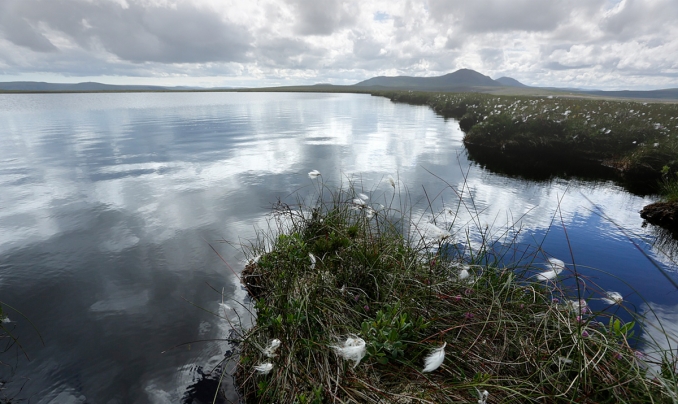Unesco World Heritage status sought for Scotland's "Flow Country"
“The Flow Country” is a large area, of peatland and wetland in Caithness and Sutherland in northern Scotland. It covers about 1540 square miles (4000 km2). It is the largest expanse of blanket bog in Europe. Blanket bog only forms in cool places with plenty of rain. The blanketing of the ground with a variable depth of peat gives the habitat type its name. The few plants that can grow here don’t rot away, but build up to form deep layers of peat. The bogs of the Flow Country have been growing for over 10,000 years, since the end of the last Ice Age, and the peat is now up to 10 metres deep.
Blanket bog covers about 20% of Scotland’s land area: some 15% of all the blanket bog in the world. The peat bog is a rich wildlife habitat and home to plants that are unique to that environment, rare birds, and distinctive species of invertebrates such as spiders and beetles. It is a breeding ground for many different species of birds as well as providing shelter for nesting birds, reptiles like frogs and snakes, and small mammals like shrews. Bogs also store more carbon than any other land-based ecosystem. This gives them an important role in the defence against the effects of climate change. They also play a major role in providing high quality, unpolluted water, making them an ideal sources of drinking water.
Peatlands are one of the most important natural ecosystems in the world. However, they are under continuous threat. The Flow Country was under severe pressure in the 1980s and early 1990s. It was damaged through the planting of non-native conifer forests and the cutting of thousands of miles of drains. However, a conservation campaign mounted by the RSPB was an important factor in preventing further deterioration. Now there are further moves to turn it into a UNESCO World Heritage Site. A World Heritage site is a landmark or area which is selected by the United Nations Educational, Scientific and Cultural Organization (UNESCO) as having cultural, historical, scientific or other form of significance, and is legally protected by international treaties.
If successful, gaining this status would help to further protect the Flow Country, as well as stimulate restoration in the area. A number of organisations are involved in the Flow Country Unesco bid and include Scottish Natural Heritage, University of Highlands and Islands (UHI), Highlands and Islands Enterprise, Highland Council, RSPB Scotland and Federation of Small Businesses (FSB). Also involved are CVS North, Wildland, VisitScotland, Scottish Land and Estates, Confederation of Forest Industries, Forestry Commission Scotland and Rural Payment and Inspection Division.






